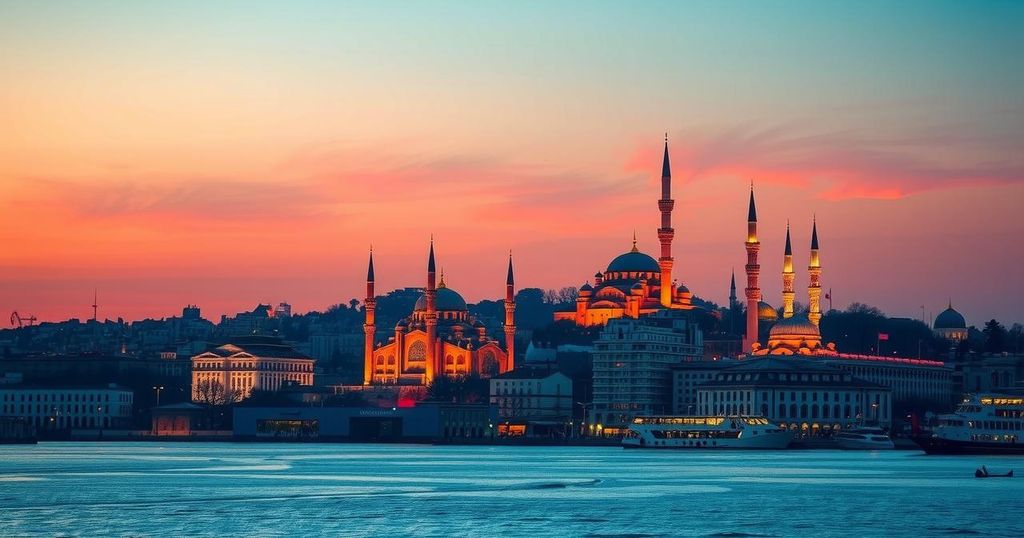U.S. and Russia Discuss Diplomatic Normalization in Istanbul Meeting

Representatives from Russia and the U.S. met in Istanbul to discuss normalizing diplomatic operations, emphasizing efforts that began in February 2025. Major challenges include rebuilding embassy staff, overcoming a diplomatic blockade, and restoring visa processes. Markov outlines four key tracks impacting relations, while cautious optimism remains regarding future normalization amidst ongoing tensions.
Representatives from Russia and the United States convened in Istanbul to discuss the normalization of diplomatic operations. This meeting follows efforts that began in February 2025, indicating a mutual interest in restoring essential diplomatic functions strained by previous expulsion actions and operational difficulties.
Kremlin spokesperson Dmitry Peskov did not reveal the specifics of the agenda, while U.S. State Department spokesperson Tammy Bruce clarified, “discussions are solely focused on our embassy operations, not on normalizing the bilateral relationship overall, which can only happen — as we’ve said — once there is peace between Russia and Ukraine.”
Sergey Markov, a Russian political analyst, shared insights on the meeting’s expectations, identifying four main tracks influencing U.S.-Russia relations: the ongoing conflict in Ukraine, restoration of diplomatic ties, potential easing of U.S. sanctions, and various global issues like the Middle East and Iran. He stated, “Right now, the focus is on the second track — the restoration of normal diplomatic relations,” emphasizing the complexity and slow pace of this process.
A crucial challenge lies in rebuilding diplomatic staff at embassies. Over the past three years, both the U.S. and Russia have engaged in reciprocal expulsions and visa denials, limiting embassy personnel. Markov noted, “The United States has repeatedly refused to extend visas for Russian diplomats, and Russia has responded in kind by limiting the number of American diplomats in Moscow,” greatly affecting embassy functions.
He pointed out that the U.S. Embassy in Moscow is currently struggling to operate, stating, “The U.S. Embassy in Moscow is barely operational, and the consulates cannot issue visas.” Markov suggested that increasing the number of diplomats is essential, positing that Russian diplomatic presence in the U.S. should rise by 25-30 times and U.S. presence in Russia by 15 times. He also highlighted the necessity of employing local staff at U.S. embassies for efficacy.
Another significant barrier identified by Markov is a “diplomatic blockade,” preventing meetings of diplomats with lawmakers in both nations, thus paralyzing essential functions. He asserted, “This blockade must be lifted if there’s to be any real normalization. Diplomats must be allowed to resume routine work and engage in substantive dialogue.”
He stressed the need for direct communication channels between U.S. and Russian government agencies to facilitate cooperation on critical matters like environmental protection and refugee aid. “Right now, ministries on both sides can’t even coordinate on issues like Arctic environmental protection or refugee aid,” he explained.
Restoring visa processes and air travel is essential, as embassies are hindered by staffing shortages and geopolitical issues. Markov stated, “You can’t resume air travel until enough people have valid visas or dual citizenship,” noting that some sanctions would need lifting for Russian airlines’ operational success.
Markov called for the reopening of the Russian consulate in San Francisco and the U.S. consulate in Yekaterinburg, which were closed due to escalating tensions. He acknowledged ongoing progress, yet emphasized its slow nature, reminding that resolutions could have been achieved earlier with stronger political will.
He remains cautiously optimistic about future diplomatic normalization, asserting that the slow pace underscores deep-rooted tensions persisting between Washington and Moscow.
The meeting in Istanbul represents a significant yet complex step towards normalizing U.S.-Russia diplomatic relations. Key challenges include rebuilding embassy staffing, overcoming the diplomatic blockade, re-establishing communication, and restoring visa and air travel systems. While progress is noted, the slow pace reflects the unresolved tensions that exist, suggesting that both nations must prioritize diplomatic engagement to advance their relationship.
Original Source: news.az







